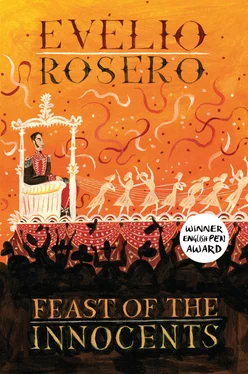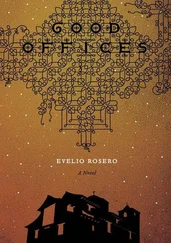“Right in the middle of Calle Real the widow wanted to go back home, but hesitated: there was death on all sides; enemies on foot and on horseback were multiplying; she didn’t know which would turn out to be for the best: to go on, to go back, to stay still; nowhere seemed like a good place; the only thing on their side was anonymity: the fact that amid all that random death, nobody noticed them, it was as if they did not exist; by lucky chance none of the eyes looking for people to kill saw them; those many eyes, reddened and hasty, passed right over them, without noticing; in the blur of victims they did not spot them, did not make them out, despite the light, because it was still light, dusk had not yet fallen.”
“They had fled up Calle Angosta, skirting bodies that were scattered like stains, in the most unlikely poses, and they had to go along jumping over these stains, deliberately ignoring them, because stepping on them occasionally was unavoidable, and they didn’t stop until they reached one side of the cemetery, where the widow imagined they would find the best place to hide; she thought it would not occur to anyone to kill in a cemetery, so what she saw appalled her all the more: plenty of people had the same idea, and they were killing them there too, in the cemetery; she could not make out whether it was men or children or women, she only saw red-coloured stains, and above all she heard them, each identical cry, unearthly, drawn out like a river.”
“She fled once more, pulling her granddaughter through the streets: at her passing front doors splintered to bits; the liberators entered on horseback, spearing and shooting anything that moved. Unable to avoid the destruction, they ran aimlessly on; they came out at the doors of the former cathedral and there encountered a group of parishioners craning forwards, into the church, paralysed in a stone-like silence. Were they pretending not to notice? As if the war were not going on around them, the rigid faces were watching something happening inside; not only did they not dare go in (as the grandmother would have liked, in order to hide), they did not dare flee either: they stayed riveted before the doors, fatally frozen, their faces fixed. Hilaria and Fátima peered in too and at that exact moment witnessed how Old Galvis got his head smashed in, at eighty years of age, right on the altar. ‘Galvis,’ the widow shouted, ‘Galvis.’ They lived near Galvis; she chatted to him at times, and now he was dead, just as they would be if God did not protect them. A stampede of soldiers dispersed the group; the widow felt the shadow of a bayonet just graze her back. She grabbed Fátima and they ran off again, because death was still circling around them, death which still did not look them in the eye, death not looking at them, still not looking at them.”
“The doors to the Sisters of Mercy’s convent were on fire. Inside, behind the smoke, tongues of flame showed glimpses of the unbridled shadows of Rifles on top of the naked shadows of screaming girls: at the same moment they raped them, they killed them, the widow observed. Fátima saw, her arm tightly gripped by her grandmother. Then she spoke in her murmuring gibberish, spoke for the first time since the catastrophe began: she asked if they were all playing in there; her grandmother did not reply, she was tormented by what the question foreshadowed. Would it be a game for Fátima, if it happened?”
“They went up to the Santiago neighbourhood, where the Church of the Apostle stood, and it was worse; the fight was still going on there, in its death throes: three or four militiamen were holding out against at least a hundred liberators, the grandmother calculated, well-versed in war. She could not help: she was in charge of her granddaughter; she had a bad arm; she was only good for running away. And the demise of these cornered men made her cry at last; they were attacking without achieving anything, barely defending themselves, they tottered weakly from here to there until they fell, hidden in a forest of lances, without a sound, as if they were grateful; it made her weep silently, and another pile of dead men made her cry some more. Dead men? Women, she discovered, it was a corner full of dead women, acquaintances of hers she recognized in horror: the seamstress Otoniela, Zenaida Montúfar the hat maker, the two Patoja sisters, Cándida Iriarte, Facunda Bucheli, Terencia and Tila Moncayo, Cirila Cruz, the deaf Castillo woman, all she had to do was look at a face to know the name straight off, it pained her, and so she stopped looking for more names and more dead, but she was shaken to her core to discover the women were carrying white flags, flags made from white cloths, which had done them no good.”
“In the midst of the dead women, Fátima inexplicably burst out laughing. And her laughter appalled her grandmother, who was leading her blindly, without a destination in mind, along the horrific street, no hope left: she thought her granddaughter had finally gone completely mad. In Taminango, one of the most traditional neighbourhoods, overflowing with the injured, the cries of those dying and the cries of those killing, they could not run any further; where would they run to? ‘God help us,’ the grandmother heard someone below her shout, ‘they’re going to murder the city.’ She was the one shouting, and it was the first time she had. Fátima did not hear her: she had felt something warm stroke the top of her head, and raised her eyes; wings grazed her forehead; it was a dark bird that escaped, soaring into the sky, and now Fátima laughed harder still, the great delirious laugh crossing her face.”
“On the banks of the River Pasto the carnage intensified: on the skyline, figures up on the bridges, figures dying, figures killing, dying and killing beneath and on top of the bridges; the rays of a curiously ruddy sun cloaked them both; where was fear leading them? In the blink of an eye they appeared in the middle of the San Andrés neighbourhood, and it was there the grandmother ran headlong into her friend Isaura Olarte, who was crying. She was fleeing with her daughter, a girl younger than Fátima; after staying hidden in the entrance to a granary, they had to leave when the main door started to burn. Just two steps away from the burning door, and perhaps protected for this very reason, the two friends tried to make themselves understood amid the explosion of whistles and gun-fire, the moans and screams, and the terrifying gallop of horses. Isaura Olarte spoke of her dead, of her house razed to the ground; she cried out, in a hoarse voice, that ‘all she asked for was a white soldier for her daughter, that she not fall into the hands of a black one, that no black man get her pregnant,’ and she cast about her in desperation as if summoning up a white soldier to save her. ‘Black or white, it makes no difference,’ the grandmother told her, and suggested they run to the Church of Jesús del Río where the statue of Our Blessed Lady of Mercy was. ‘There,’ she said, ‘the miracle will happen.’ Isaura Olarte refused with a shake of the head: ‘They kill more in the churches; it’s like going up to them and saying here we are, kill us .’ The grandmother remained stock-still, her eyes trained on the inferno; the faces of the horsemen who directed the slaughter were all soot-streaked. She pulled herself together. ‘Come with me,’ she shouted again, but already her friend and the daughter were moving off into the swirling mass, pressed like bundles up against the bloody walls. Now the grandmother shook with fury, she grabbed Fátima roughly. ‘Get a move on, you idiot,’ she told her, and it was the first time she ever spoke to her that way. ‘Why don’t you get going?’”
“They came to the Church of Jesús del Río.”
“And that’s where their troubles began.”
Читать дальше












